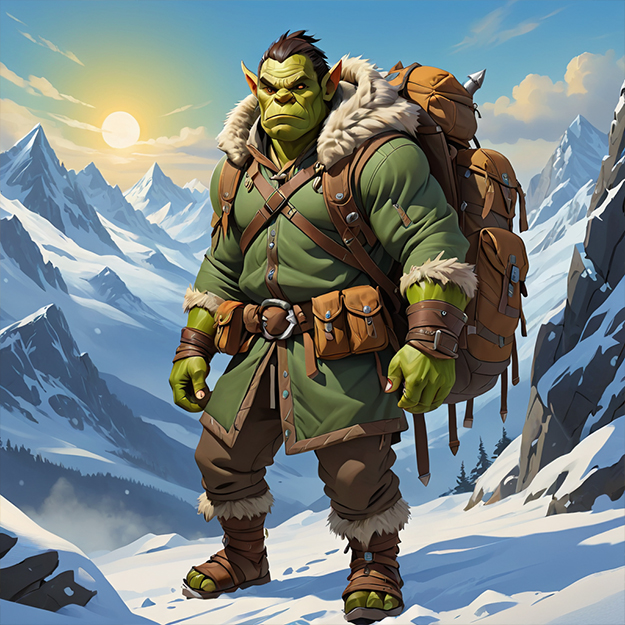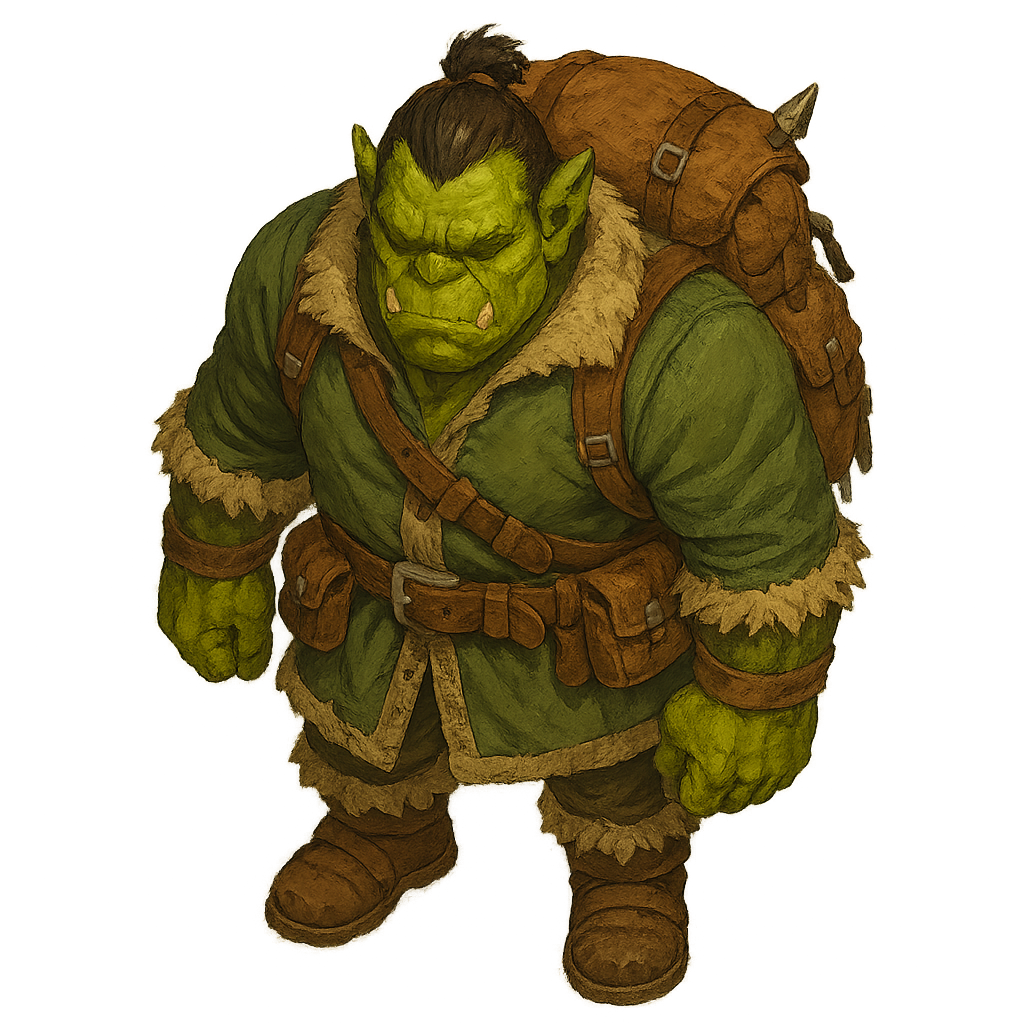
Survival
Survival in the wild is a multifaceted challenge, requiring a blend of resourcefulness and preparation. In the untamed wilderness, the first priority is sustenance: hunting game, foraging edible plants, and mastering the art of cooking in rugged conditions. Clothing becomes not just an accessory but a shield against the elements, demanding you choose the right materials to protect against heat, cold, or rain. Reading the skies and predicting weather patterns is a skill that can mean the difference between life and death, dictating whether to press forward or seek shelter. Knowledge of the forest’s bounty—what can nourish and what might poison—is a crucial asset, as is the foresight to pack essential items in your backpack. Every choice, from the knife you carry to the rope you tie, is a step toward enduring the wilderness and claiming mastery over nature’s trials.

Top Down Token
Right click on image to download PNG

Survival
Frequent routines might not be the norm when you strategize your adventures effectively. However, unexpected situations can arise, presenting opportunities to deepen the narrative and challenge the party. Whether it’s dealing with fatigue, hunger, or environmental extremes, these scenarios can add layers of complexity and immersion. Below are some optional mechanics and guidelines to navigate such situations.
These examples serve as a starting point. The goal is to enhance gameplay without overcomplicating it. The Game Master (GM) retains discretion over whether and how these elements are implemented to suit the group’s preferred style of play.
SLEEP
Incorporating sleep as a mechanic encourages players to consider their characters’ physical and mental well-being. Resting might be necessary to regain spell slots, hit points, or special abilities, as well as to reset conditions like exhaustion or mental fatigue. These mechanics can lead to engaging roleplaying opportunities, such as deciding where and how to set up camp in dangerous or unfamiliar terrain. Players might assign night watch shifts, creating potential for chance encounters or bonding moments between characters. Lack of sleep could introduce penalties, such as slower reaction times or hallucinations, adding urgency to find safe rest.
If necessary, make a Perception check.
FOOD
Introducing food mechanics creates resource management challenges and a sense of realism. Characters might need to forage, hunt, or fish in the wild, engaging with their environment in new ways. They may also need to manage their inventory of rations or seek out local markets, inns, or traders for supplies, fostering NPC interactions and social roleplay. Food scarcity can influence decisions, such as whether to push deeper into a dungeon or return to safety to resupply. Spells like Goodberry or Create Food and Water can alleviate these challenges but require forethought and preparation, reflecting the party’s priorities.
If necessary, make a Nature check.
If necessary, make a Surviving check.
TEMPERATURE
Environmental conditions can present unique challenges and encourage creative problem-solving. Cold climates may require insulated clothing, fire sources, or magical protection to avoid frostbite, hypothermia, or exhaustion. Hot climates might necessitate finding water sources, lighter clothing, or shade to prevent dehydration and heatstroke. These elements can create tension, especially during prolonged exposure to extreme conditions, or when resources like water and firewood are limited. Temperature mechanics could also affect movement, exploration, or combat, encouraging players to adapt their tactics and use inventive solutions, such as crafting survival gear or using spells to mitigate the elements.
If necessary, make a Constitution check.
If necessary, make a Nature check.
If necessary, make a Crafting check.
If necessary, make a Surviving check.
BACKPACK GEAR
Managing backpack gear adds an extra layer of immersion and strategy. Players must consider what their characters carry and how it impacts mobility and survival. Establishing limits based on carrying capacity encourages prioritizing essential items, while overloading might lead to slower movement or reduced effectiveness. Versatile gear such as ropes, torches, climbing kits, or bedrolls can provide creative solutions to challenges during exploration. Items like flint and steel, cooking kits, and emergency potions add depth to resource management, and describing how characters use their gear enhances immersion.
If necessary, make a Strength check.
If necessary, make a Surviving check.
WEATHER AND SEASONAL EFFECTS
Weather can set the tone for an adventure, creating dynamic challenges and influencing decisions. Rainstorms may cause slippery terrain, difficulty lighting fires, or reduced visibility, while snow and ice can slow travel or increase the chance of getting lost. Heat waves might lead to exhaustion or dehydration, forcing the party to carefully manage their water supply. Weather can also impact NPC behavior, alter trade availability, or influence the timeline of an adventure, adding strategic depth to travel and planning.
If necessary, make a Surviving check.
LIGHT AND DARKNESS
Light and darkness introduce an atmospheric element that emphasizes preparation and teamwork. Light sources like torches, lanterns, or magical illumination may be essential in dungeons or during night travel. Without sufficient light, characters might suffer penalties to perception or navigation, creating tension and urgency. Darkness could also become a tool, as spells such as Darkness or Light might be used to gain tactical advantages in combat or exploration.
If necessary, make a Perception check.
TOOL PROFICIENCY AND CRAFTING
Tool proficiency and crafting mechanics encourage creativity and resourcefulness. Characters skilled with tools can forge or repair gear, gather and prepare resources, or craft useful items like traps or shelters. A herbalism kit might be used to create medicinal remedies, while smithing tools could repair damaged weapons. These activities allow characters to engage deeply with their environment and provide rewarding opportunities for roleplay and collaboration.
If necessary, make a Crafting check.
CURRENCY AND TRADE
Expanding on money and trade mechanics can create meaningful decision points and roleplay opportunities. In remote areas, characters might need to barter items such as food or weapons instead of relying on coins. Travel costs, like tolls or hiring guides, may strain resources, and specialized gear could require characters to seek out unique merchants or craftsmen. Economic challenges can make rewards more satisfying and strategic purchases more impactful.
If necessary, make a Diplomacy check.
If necessary, make a Society check.
SOCIAL INTERACTIONS AND MORALE
Focusing on social interactions and morale adds emotional stakes and depth to group dynamics. Long journeys or dire circumstances might test the party’s morale, creating moments of conflict or bonding. NPC relationships can be influenced by characters’ actions, providing opportunities to build alliances or face hostility. Cultural differences and language barriers can further enhance roleplay, requiring creative problem-solving or diplomatic approaches.
By incorporating these elements thoughtfully, you can create a richer, more immersive experience that balances realism with storytelling. Discussing these mechanics with players and tailoring them to the group’s preferences will ensure that the game remains enjoyable and engaging.
If necessary, make a Society check.

